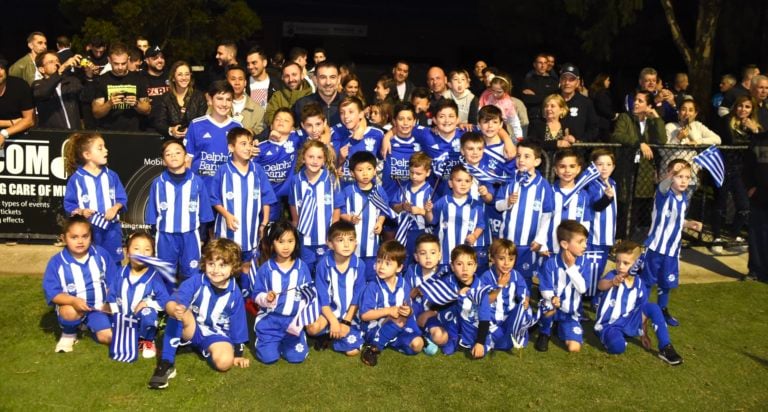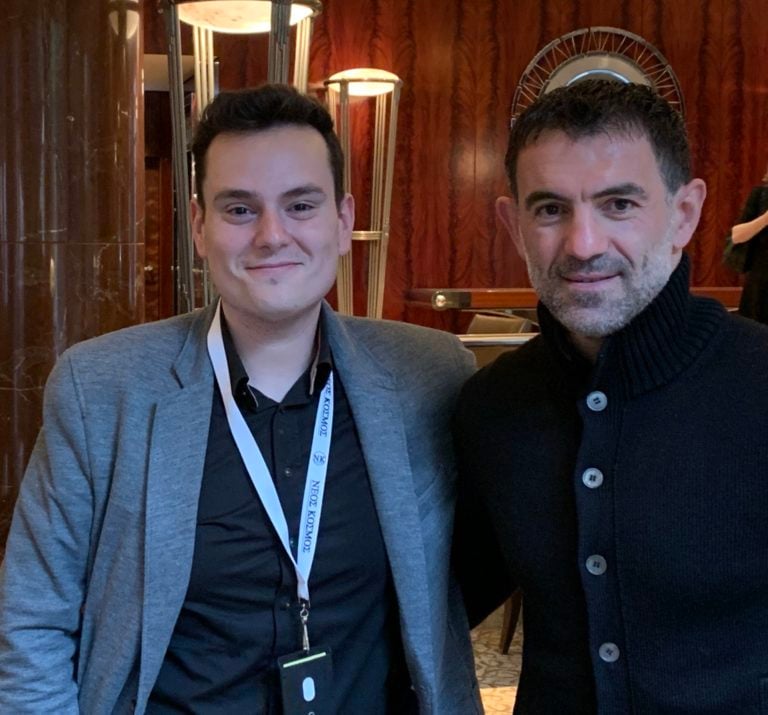A man like Giorgos Karagounis needs no real introduction. His accomplishments speak for themselves. Many have written about his deeds, both in club and national football, and he enjoys an illustrious career that many would be envious of. A footballer of his stature has much to brag about, but Karagounis maintains a low profile and prefers to use the term ‘we’ when speaking about his success, recognising the contribution of his teammates in all he has achieved. Proud of his role as part of the team, he talks up all the players and teams he was a part of. It’s easy to see why he was chosen as captain of the Greek national team, a role that he carries with pride until this day even though he hung up his boots long ago. We kick-off our conversation talking about the Greeks living here in Melbourne, and what the former Panathinaikos player thinks of them.
You’ve visited Australia before. What are your impressions of Greeks of Australia?
Only the best! I know they love their country and that whatever happens in Greece, whether good or bad, affects them as well, perhaps even more so than us that actually live there, as they really miss their homeland. And I always feel that when I come into contact with them. I know their love for their homeland is great and that’s exactly the reason that brought me here in the first place to see them again. Last time (2016) I was here with the team so I didn’t really have an opportunity to do much, but now that my professional obligations are over, I’ll have the time to see more people and things here in Melbourne.
You started off at Panathinaikos and Apollon, then you were given the chance to play abroad. Tell us a bit about what it’s like to play in those advanced championships.
Those are very different experiences, both on and off the pitch. Their mentality is different (to that of Greece), so is their philosophy. You live through entirely new situations. When I went to Italy and Inter Milan, they had the best league with the greatest players at the time. I met some wonderful people, whether we’re talking about club owners, players, managers, etc. Of course the competition was equally great. After that I went to Portugal, to a very great club (Benfica), with many fans and a rich history, which was also a great experience. They offered me the jersey with the number ’10’ on the back, which for them is symbolic due to the fact that it was worn by one of the greatest players of all time, Eusebio. To me, that was a great honour. England and Fulham was the “cherry on top” I would say because I had the chance to end my career in the best way I could’ve imagined. Playing two years in the Premier league then going on to compete in Brazil with the Greek national team for a place in the World Cup quarter-finals.

Let’s talk a bit about the national team. I’ve had the chance to speak to other members of that golden generation and I always ask the same question: What was the secret of your success, what did the team of your time have that others didn’t, allowing you to win the Euro of 2004 and everything else that you did?
It was a number of things, not just one in particular. One of the most important factors was that we had a number of great footballers in value, not age.
There were many great players on all fronts and that was one of the main elements (of our success.) As Greeks, we have a tendency to not give ourselves credit, but I always mention this. Because without great players, you can’t go on to win a trophy as big as this. Of course, we also had a manager (Otto Rehhagel) that helped this group of individuals become a team. He created a tight group of 30-35 players within two years, which allowed him to create a foundation for the team, something that was very difficult to accomplish in previous years. So what he did worked in the best way imaginable. And that’s exactly what helped forge and strengthen our bond as a team. I also think that many of the members of that team were in great shape and in a good age during that period. There were some real personalities inside the locker rooms and that played its own part. They were leaders at their clubs, which is something they carried over to the national team. All these elements that I mentioned are what worked together so that we could accomplish this triumph, which was fair beyond any shred of a doubt.
READ MORE: International soccer star Giorgos Karagounis visits Alphington Grammar School
https://www.youtube.com/watch?v=E7QewM4s8ow
What about in Brazil? Did you believe that if you advanced past Costa Rica, you had what it took to make it even further?
You can’t be sure of that. But yes, we felt as if we could go very far in the World Cup. Besides, we had already proven it. We were among the world’s top 16 teams. In the game against Costa Rica, I believe we were the greater team on all aspects. But then, that’s football for you. And that’s exactly why it’s the king of games.
What would you advise someone who is currently playing for Greece’s national team?
Things are fairly simple, it’s not really advice. You need to be loyal to the team, despite mounting obligations. From each player, there are definitely high demands from their clubs. But in order to achieve something at the national level, you need to make sacrifices. Without sacrifices, you won’t get anywhere.










